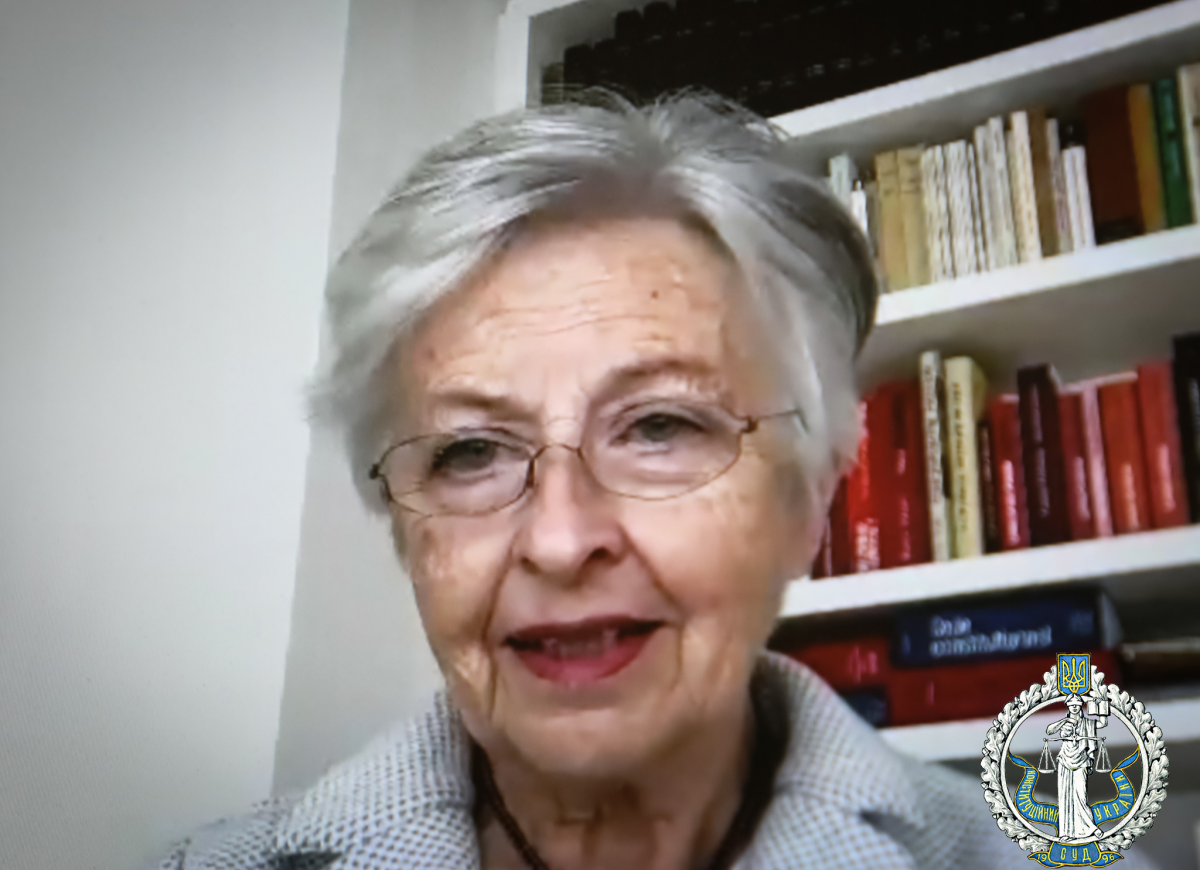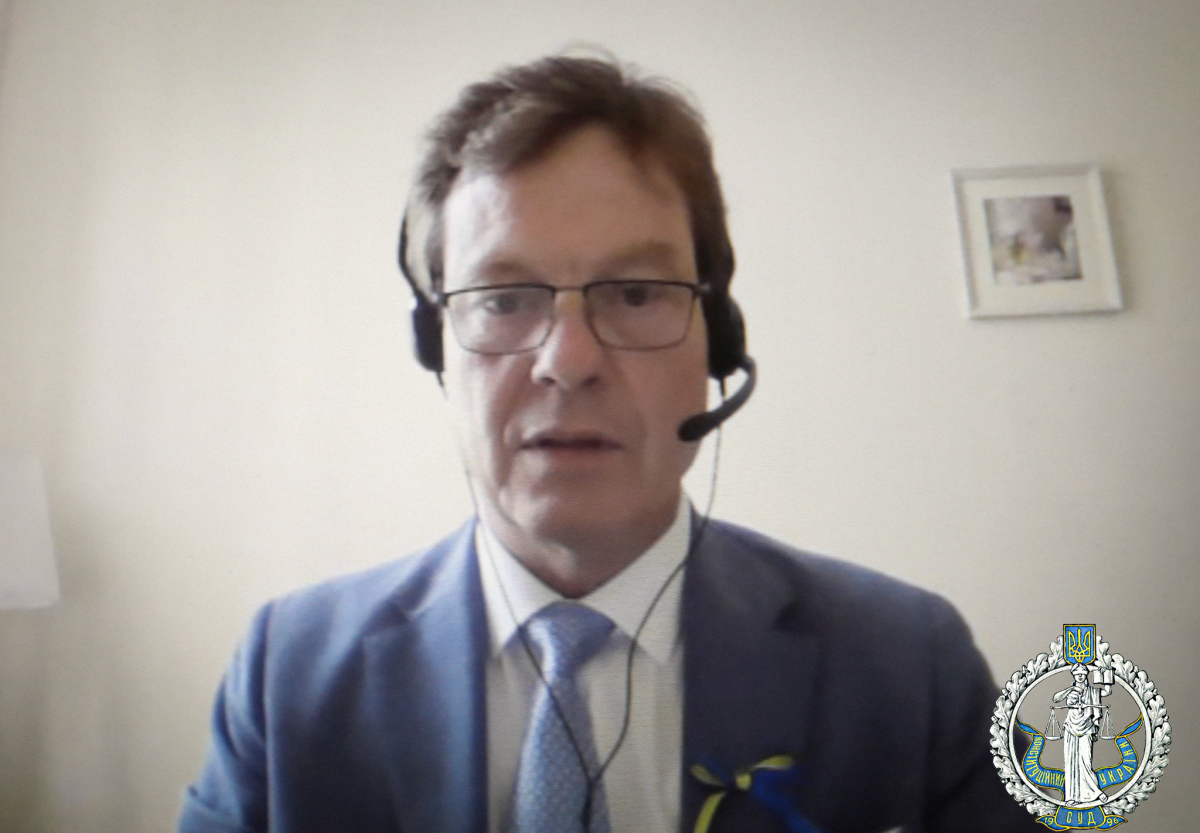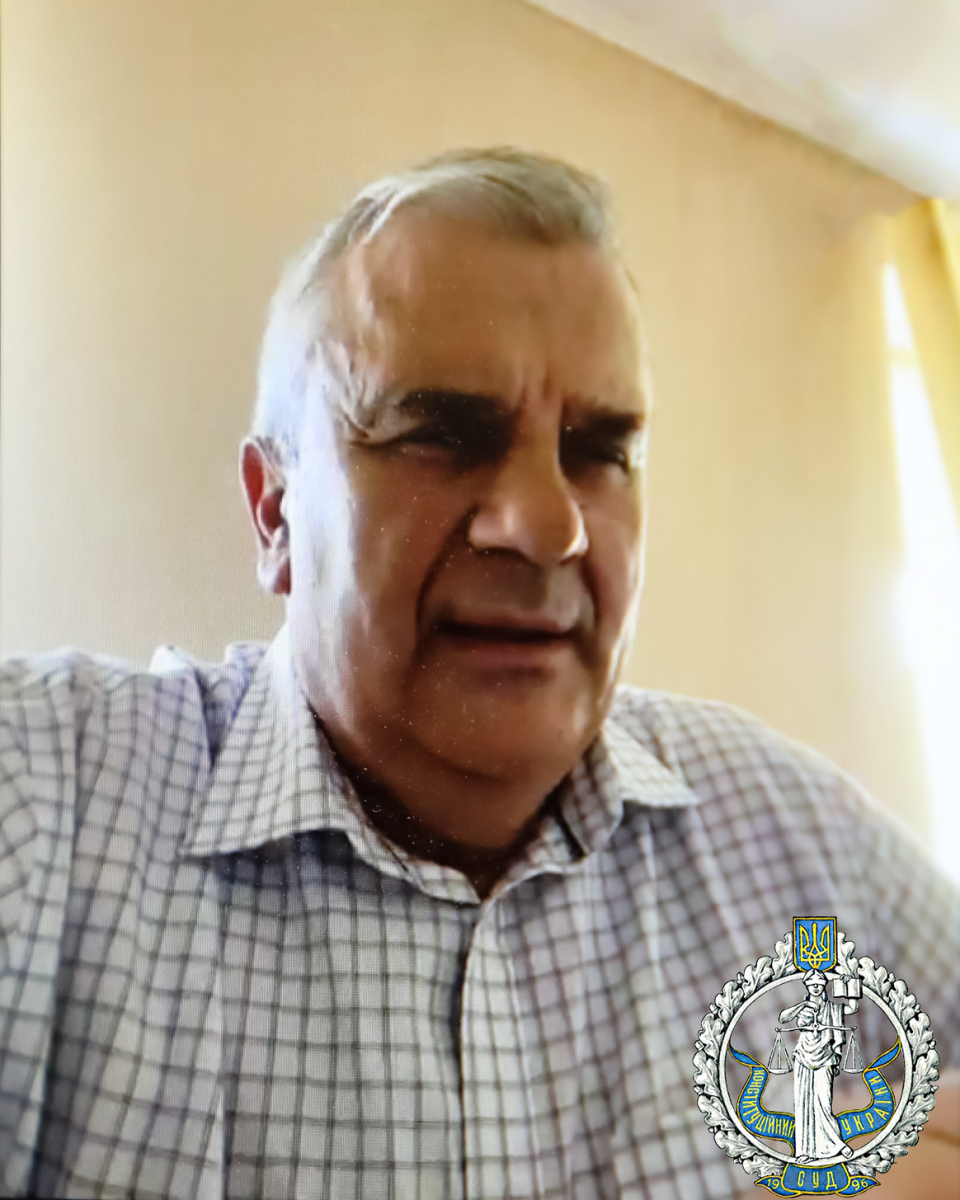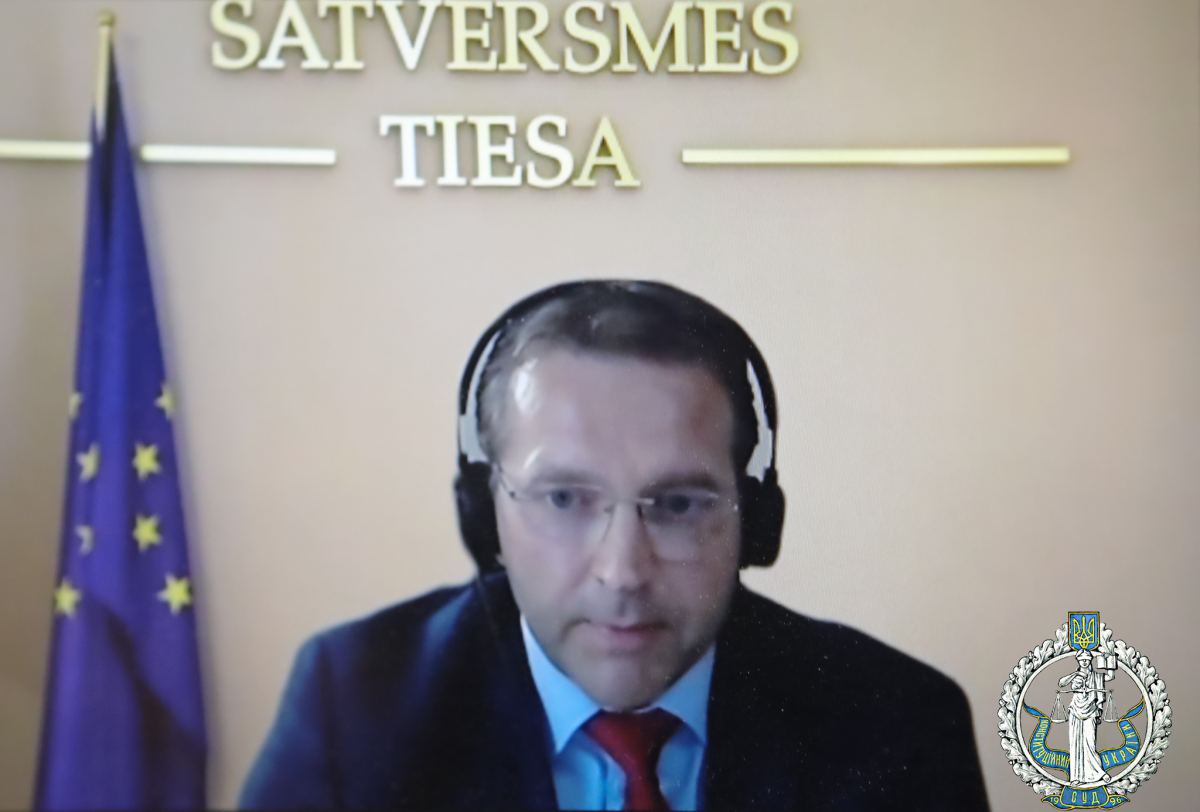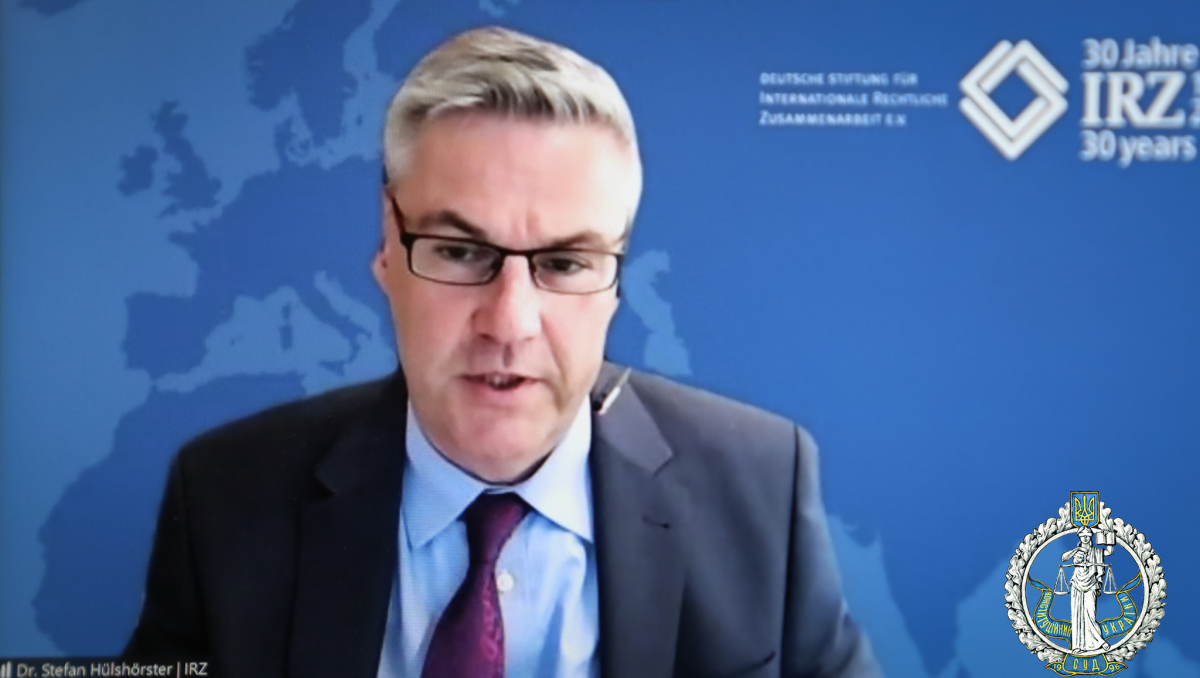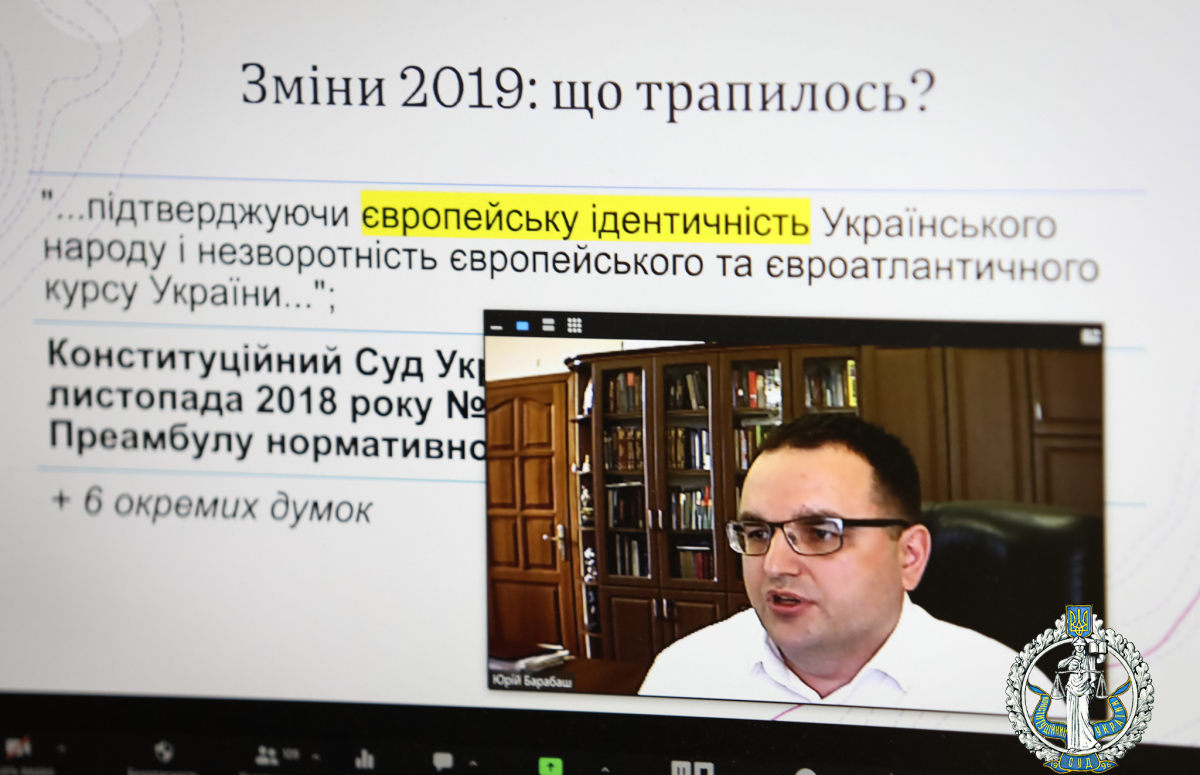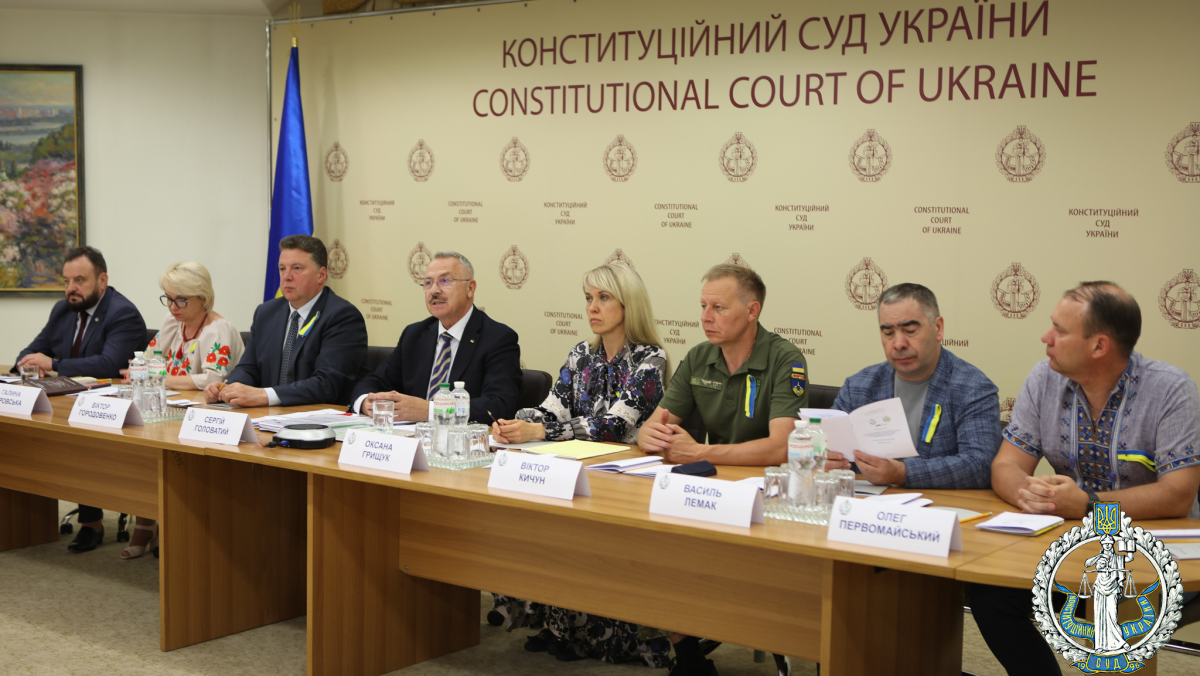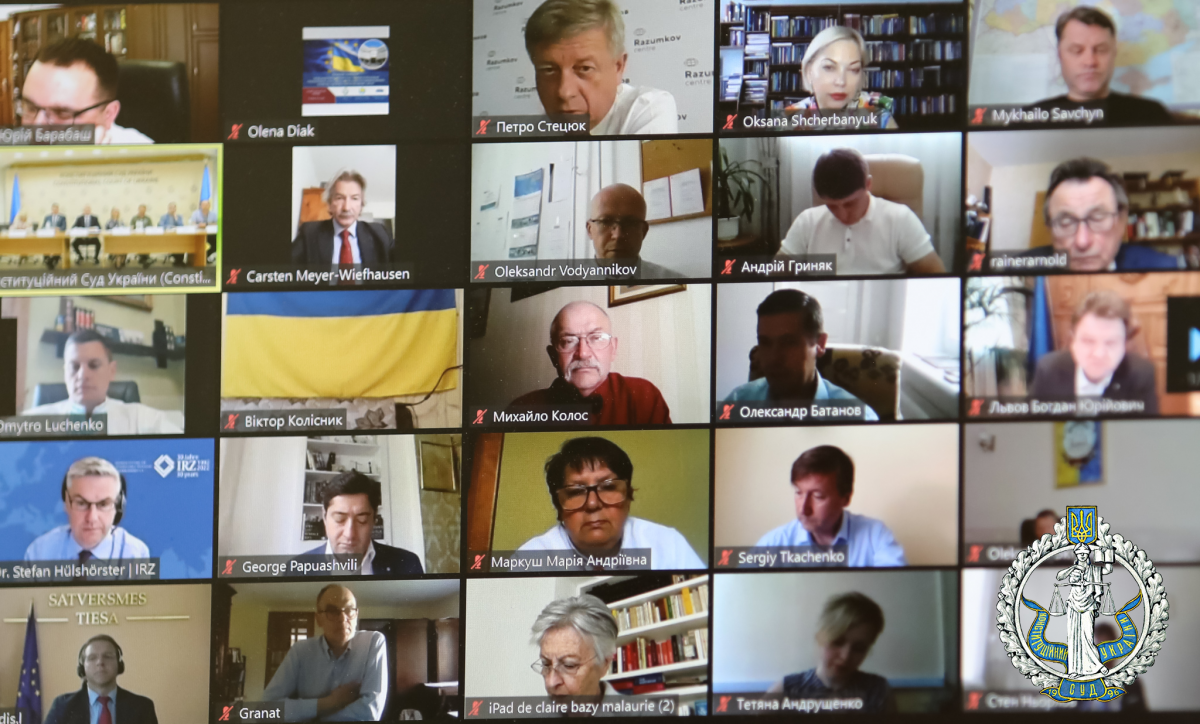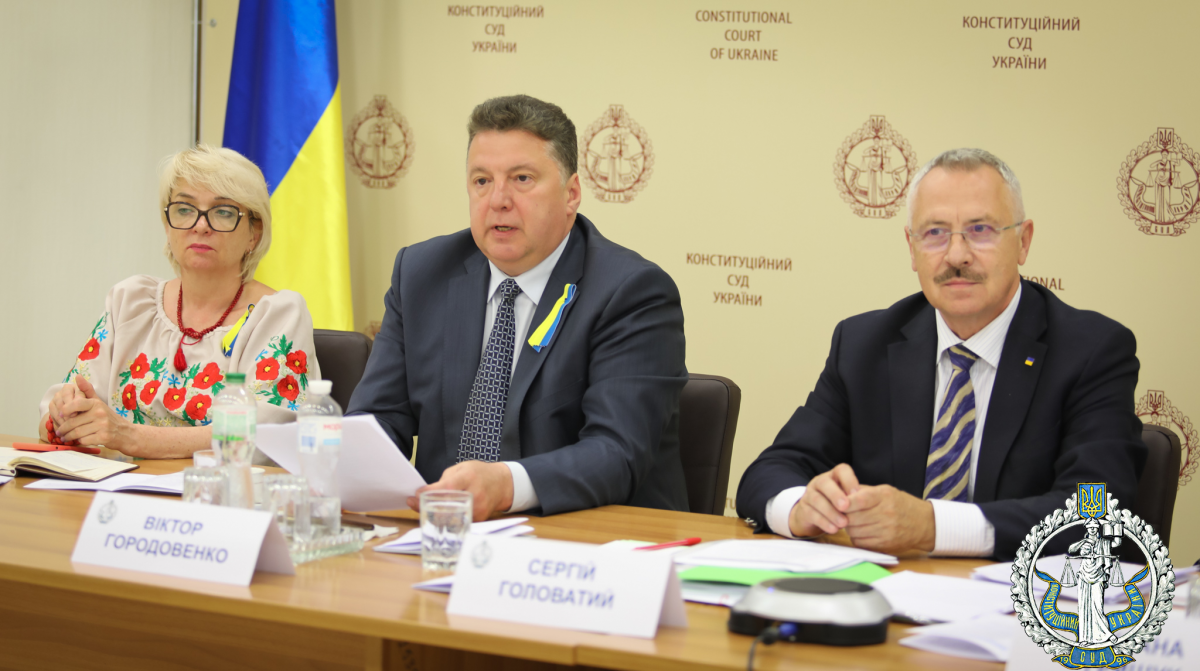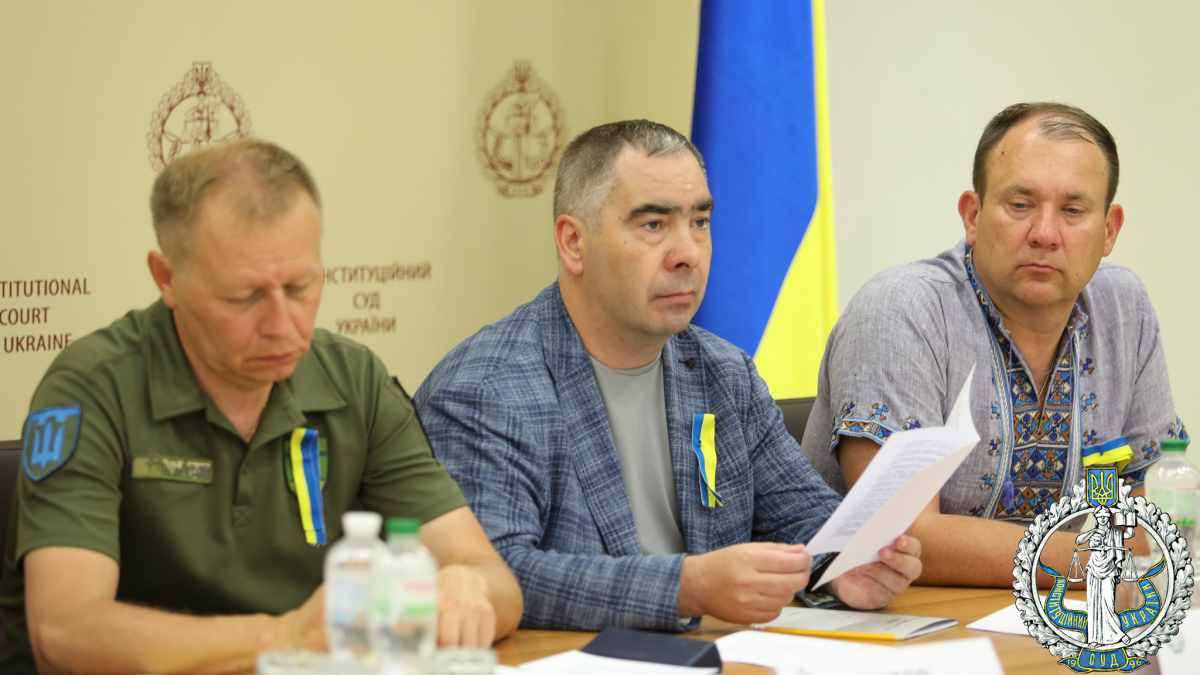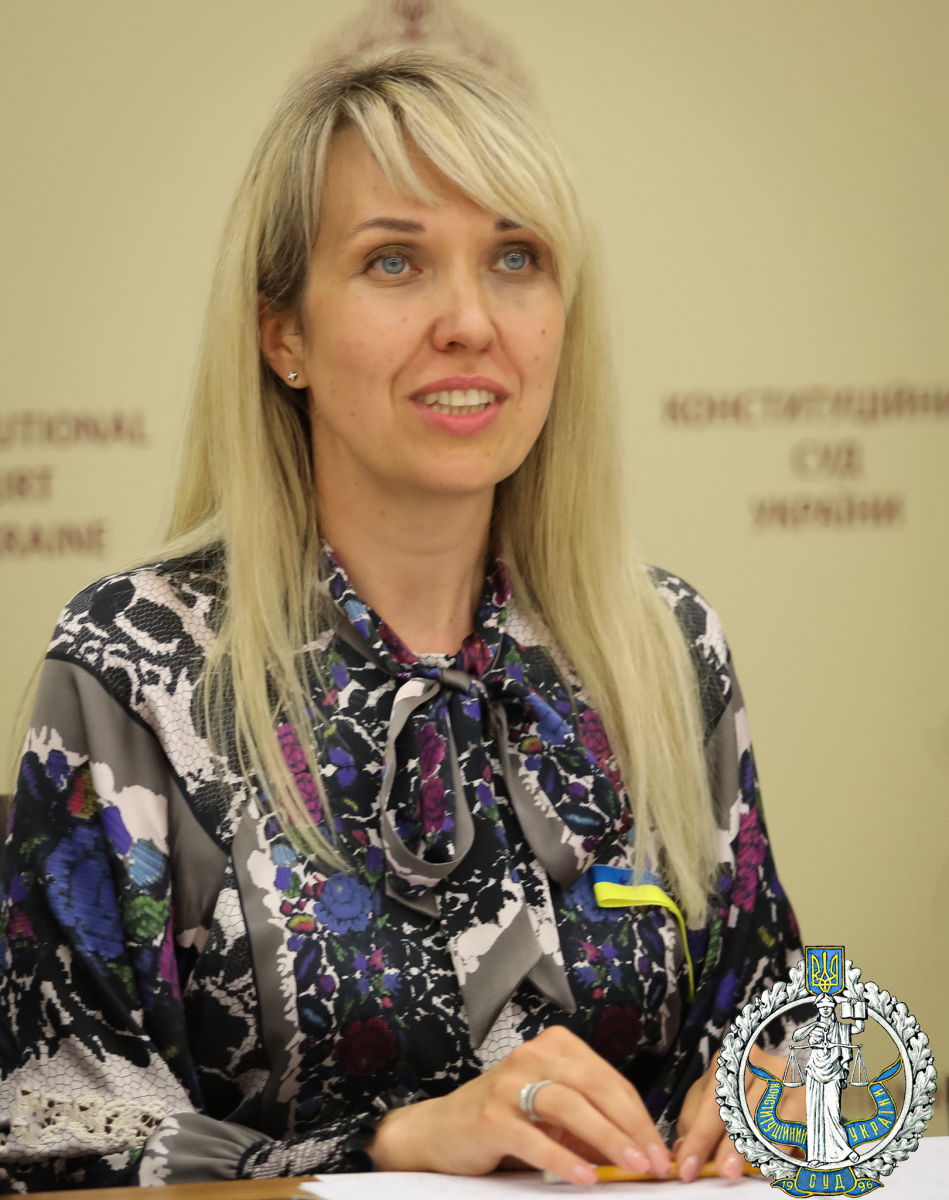29.06.2022
On June 28, 2022, on the occasion of the Constitution Day of Ukraine the Constitutional Court of Ukraine held an online International Conference “The Role of the Constitutional Court of Ukraine in the Implementation of the State’s Strategy to Obtain the European Union Membership”.
The event was organised by the Constitutional Court of Ukraine and the National Academy of Legal Sciences of Ukraine with the support of the OSCE Project Co-ordinator in Ukraine.
Among the participants of the International Conference were Chairman of the Verkhovna Rada of Ukraine Ruslan Stefanchuk, judges of the Constitutional Court of Ukraine, President of the European Commission for Democracy through Law (Venice Commission) Claire Bazy Malaurie, President of the National Academy of Legal Sciences of Ukraine Oleksandr Petryshyn, Head of Office, Representative of the Secretary General of the Council of Europe on the coordination of cooperation programmes of the Council of Europe Steen Nørlov, Head of Legal and Consulate Department, Embassy of the Federal Republic of Germany in Ukraine Carsten Meyer-Wiefhausen, Director of the German Foundation for International Legal Cooperation (IRZ) Stefan Hülshörster, National Legal Adviser to the OSCE Project Co-ordinator in Ukraine Oleksandr Vodiannikov, as well as retired judges of the Constitutional Court, members of the Research and Advisory Council of the Constitutional Court of Ukraine, representatives of foreign bodies of constitutional jurisdiction, international organisations and foundations, representatives of the diplomatic corps, the scientific and academic community and international experts.
Serhiy Holovaty, Deputy Chairman of the Constitutional Court of Ukraine, Doctor of Law, Professor, Corresponding Member of the National Academy of Legal Sciences of Ukraine addressed the participants of the event with an introductory speech.
Serhiy Holovaty began his speech with the words about the cruel and inhuman war waged by Russia against our state. He emphasised that for years not only the territory of Ukraine, its sovereignty and statehood, but also the Constitution of Ukraine has been the goal of the Moscow state, as it has always seen in the Constitution exactly what Ukraine protects. At the beginning of the armed aggression in 2014, when the annexation of Crimea took place, the Russian Ministry for Foreign Affairs made a statement that put forward the conditions for the Ukrainian Constitution to be changed: firstly, implementation of federalisation (and this would destroy the Ukrainian state as a unitary state), and secondly, granting the Russian language the constitutional status as the second state language in Ukraine. Consequently, if this happened, then the Ukrainian nation would turn into mankurts, people without historical memory, without knowledge of the history of their people, etc. In fact, what Russia has failed to do due to changes to the Constitution of Ukraine, that is, legally, Russia is doing physically today: it is destroying the Ukrainian nation by war. According to Serhiy Holovaty, Russia is doomed to fail, because Ukraine will survive as a state and the Ukrainian people will survive as a nation.
Serhiy Holovaty noted that in Ukraine the first legally significant Constitution appeared in 1996, which was born in a very sharp political struggle between political forces and institutions. Then the parliament did adopt the Constitution, which specifically stipulates that it has the highest legal force in Ukraine. However, in order for this to be not only a slogan, but the legal force to act, an institution was established – the Constitutional Court of Ukraine, which is entrusted with the role of ensuring the highest legal force of this Constitutive Act. The Constitutional Court of Ukraine emerged as an institution, continuing the European tradition that has already appeared and developed in post-war Europe. It was post-war Europe that called for the existence of constitutional jurisdiction to protect human rights, true democracy and the rule of law, that is, those values on which the basis of which it appeared.
In his speech, the Deputy Chairman of the Constitutional Court, also spoke about the importance of the activities of the European Commission for Democracy through Law (Venice Commission), which was entrusted to work with national constitutional courts, helping them develop their doctrine and, thus, with other institutions of the Council of Europe to ensure the sustainability of European values and their effectiveness. It is precisely because of the positive Opinion of the Venice Commission on the Constitutional Treaty between the President and the Verkhovna Rada, Ukraine, back in 1995, not yet having its own democratic Constitution at that time, gained exclusive membership in the Council of Europe. Since the introduction of the European model of constitutionalism in Ukraine in 1996, based on the European constitutional heritage, it has continued to develop and the Constitutional Court of Ukraine has played a proper role in this.
As Serhiy Holovaty noted, in recent years the Constitutional Court of Ukraine has increasingly relied on European standards set by European institutions. In particular, the Court regularly refers to the Venice Commission’s Report on the Rule of Law and relies in its reasoning on the tools provided in the “Rule of Law Checklist”. The Constitutional Court of Ukraine also regularly applies to the Venice Commission for amicus curiae briefs. In this context, he added that the Constitutional Court proves that it stands on European values and is able to do so further.
The Deputy Chairman of the Constitutional Court also reminded the conference participants of the Copenhagen criteria adopted by the European Council in June 1993. Particularly, he stressed that this document was specially written for post-communist, post-dictatorial, post-totalitarian regimes, in order to obtain membership in the European Union. The document clearly articulates political, economic and other criteria for this purpose. According to the political criterion, membership in the European Union requires that the candidate country achieve the stability of institutions that guarantee true democracy, rule of law, human rights, respect and protection of minorities.
Therefore, since Ukraine received the status of a candidate for membership in the European Union, the question of Whether Ukraine will become a member of the EU is no longer on the agenda. Instead, the question is: When can it obtain such a membership? Ukraine will definitely become a full member of the European Union as soon as it is able to take on the obligations arising from membership by fulfilling, in particular, the political conditions set out in the Copenhagen criteria, Serhiy Holovaty stressed at the end of his speech.
In his welcoming speech, Ruslan Stefanchuk, the Chairman of the Verkhovna Rada of Ukraine, congratulated all the participants of the International Conference on the historical decision for the Ukrainian people to grant Ukraine the status of a candidate for membership in the European Union. He also thanked all those who, in one way or another, made efforts to achieve this intermediate goal. “Granting to Ukraine the status of a candidate member of the European Union poses a number of new challenges for all of us, which we will certainly overcome through joint efforts. In particular, we are talking about challenges in the field of constitutional justice. We all understand that the role of constitutional judicial control is extraordinary and has a significant impact on all spheres of public and state life. Therefore, the decisions of the Constitutional Court must evaluate the acts post factum in terms of their compliance with the Constitution or interpret its provisions. The motivation for such decisions should reflect and guide the development of society, serve as a legal and moral guide for future decisions of all branches of government. The Parliament must take into account the decision of the Constitutional Court in the legislative process, the Government – in making administrative decisions, the judiciary should change the practice, taking into account the arguments given by the Constitutional Court. Therefore, it is the decision of the Constitutional Court that should be a guarantee that any activity of the authorities is consistent with the Constitution,” Ruslan Stefanchuk stressed.
Presentation by Ms Claire BAZY MALAURIE, President of the Venice Commission
Dear Acting Chairman of the Constitutional Court of Ukraine
Dear Presidents and Judges,
Excellencies,
Ladies and Gentlemen,
The 26th anniversary of the Day of Constitution of Ukraine takes place in tragic circumstances, in the middle of a war of Russian aggression against Ukraine.
I first expressed my firm condemnation for this act of aggression by the Russian Federation in my public statement of 1 March 2022.
This statement was supported by the whole Venice Commission at its plenary session on 19 March 2022. The Commission expressed its „full solidarity with Ukraine, which is fighting for the protection of our shared European principles and values of democracy, human rights and the rule of law“.
We deplore the on-going loss of lives and the destruction in Ukraine. Using violence instead of dialogue goes against everything that the Venice Commission stands for; it goes against the core values of the Council of Europe: democracy, the rule of law and, of course, the protection of human rights.
Against the background of these tragic events, today we discuss a more encouraging topic: the consequences of the recent decision by the European Council to grant the status of candidate country to Ukraine, in recognition of its European perspective.
This is a very important step forward for both the Ukraine and the EU.
As we know well from other States that joined the European Union, accession is a complicated process but one that thrusts a country forward in its path.
This concerns so many aspects, including economy, health, social affairs to name but a few.
Being a candidate country to the European Union entails the need for the constitutional and legislative framework to meet very high standards.
Ukraine has been a member of the Council of Europe since 9 November 1995 and has been working on meeting these standards since then. Constitutional and legal reforms have been prepared with the assistance of several Council of Europe bodies, and in particular with the Venice Commission.
It has been a complex process, which has witnessed steps forward but also sometimes backwards. It has overall registered progress, and in this connection I wish to pay tribute to the institutions of Ukraine - the President, the Government, the Verkhovna Rada, the Supreme Court and the ordinary courts, the Ombudsman, and the Constitutional Court - which have continued to work towards democratic development, but also and to a great extent to the Ukrainian people and civil society who have shown resilience and commitment.
The process of accession to the European Union will give a new impetus to reforms and will allow to take stock of areas where reforms are still needed. The work with the Council of Europe will continue based on the parameters established by its monitoring bodies and its advisory bodies, including the Venice Commission.
In the past, the Venice Commission has provided many opinions for Ukraine. You are one of our best ‘clients’ if I may say so. Since 1995, the Venice Commission has given 96 opinions for Ukraine. This represents a substantial part of the work of the Venice Commission.
The pace was again very brisk until the beginning of this year, when we decided not to interfere with the state's priority of action in the bursting conflict, and so to retain temporarily our pen. We will resume our work with you as soon as possible. At our last session, however, we have adopted an amicus curiae brief for the Constitutional Court of Ukraine, at its request, as the Court continues to function despite the war, which is certainly commendable.
I can affirm that our recommandations have been formulated against the background of thorough work and a deep knowledge which the Venice Commission has carried out over the years in dialogue with the authorities and the stakeholders of Ukraine.
Yes, the Venice Commission has sometimes been critical of the manner in which certain reforms were proposed to be carried out.
Anyhow, all our recommendations have been made with a view to meeting Council of Europe standards and thus enabling European integration, and many of them remain valid. While our recommendations are not binding, I encourage the Ukrainian authorities to review what has been said on so many crucial areas.
The implementation of some recommendations has been hampered by the aggression against Ukraine, but I am confident that they will be taken up again soon, including in the framework of EU accession.
This concerns in particular the efforts to achieve and independent judiciary, which will be of crucial importance for the phase of reconstruction.
In the EC decision, there are direct references to the work of the Venice Commission, including on the law on de-oligarchisation. This is indeed a very important topic for Ukraine, and a priority which - like any and all other reforms - needs to be carried out with due respect to the rule of law and for human rights.
My previous remarks include the Constitutional Court itself. As you will remember, we issued two opinions, in December 2020 and March 2021. The opinion on the draft law on Constitutional Procedure was a direct follow-up to the urgent opinion on the Reform of the Constitutional Court from December 2020. Since then, however, the Law on the Constitutional Procedure has not been adopted.
Furthermore, the European Commission requested to enact and implement legislation on a selection procedure for judges of the Constitutional Court of Ukraine, in line with Venice Commission recommendations. In our opinions, we have discussed these issues and we are ready to work on draft legislation on these issues.
As it was said already in 2009, in the first Congress of the World Conference on Constitutional Justice, constitutional courts are not established just because it is modern and fashionable to do so. Constitutional justice is a key element in fostering and deepening the basic values enshrined in the Constitutions.
In our European countries, it means precisely that constitutional courts have to ensure that the executive and legislative acts are consistent with the Constitution, human rights norms, and, and I underline, the Rule of Law. These are European requirements.
Let me repeat that the role of a constitutional court is crucial, as an independent arbitrator whose decisions are binding on all. As they have the last word in so many important disputes; it is important for any Constitutional Court to enjoy public trust but also international recognition that will support their position as guarantor of the legal and constitutional order.
Mr Chairman,
Let me congratulate Ukraine upon its EU candidate status. This is a key step forward for Ukraine and its brave people. It will lead to improvements in many areas but also as concerns democracy, the protection of human rights and the rule of law.
I am confident that the EU candidate status will represent a renewed commitment and an even stronger motivation to implement the Council of Europe standards;
The Venice Commission stands ready to support you vigorously.
Thank you for your attention.
Steen Nørlov, Head of Office, Representative of the Secretary General of the Council of Europe on the coordination of cooperation programmes of the Council of Europe, noted that the Constitution of 1996 became a very important stage for Ukraine after gaining independence. He stressed that the Council of Europe supports the sovereignty of Ukraine within the internationally recognised borders and contributes to the establishment of rule of law, democracy and the protection of human rights in Ukraine. “I congratulate all the people of Ukraine with the fact that on 24.06.2022 the EU leaders granted Ukraine the status of an EU candidate member, which confirms that Ukraine is a member of the European family, governed by the rule of law, democracy and the protection of human rights,” Steen Nørlov added.
Addressing the participants of the event, Oleksandr Petryshyn, the President of the National Academy of Legal Sciences of Ukraine, accentuated that the adoption of the Constitution of Ukraine on June 28, 1996, defined the most important principles of a sovereign democratic state governed by the rule of law. “Ukraine today is a young democracy, and therefore the search for optimal models of political life of our country, legal models of activity of state bodies, protection of human rights continues. It should not be forgotten that constitutional norms and values that meet European standards should become the basis of this search process,” Oleksandr Petryshyn noted. According to him, currently this search is exacerbated by two factors: the first is the need to understand the peculiarities of the implementation of constitutional norms, namely, in terms of protection of human rights and the activities of state and judicial power in wartime; the second is a significant step on the way to full membership in the EU, when we have been recognised not only by the European perspective, but also by the legal status of the candidate. The latter involves extensive work on the adaptation of Ukrainian legislation to EU standards. “There is no doubt that the Constitutional Court of Ukraine, which is an integral part of European constitutional democracy, is called upon to play an important role in this process. Without the Constitutional Court and its active position, it is difficult to imagine the achievement of the necessary results in this complex process of moving towards European standards,” the President of the National Academy of Legal Sciences emphasised.
Oleksandr Vodiannikov, National Legal Adviser to the OSCE Project Co-ordinator in Ukraine, noted that the Ukrainian people are fighting for their right to a European and democratic future. The right to a society where the people themselves, not a foreign dictator, determines their destiny, where the rule of law prevails, human rights and freedoms are ensured.
„ The enemy hoped that Ukraine's democratic institutions would collapse rather quickly and the country would become easy prey, but democratic institutions proved their resilience. It is gratifying that the Constitutional Court of Ukraine has been operating during an alarming time, including the battle for Kyiv. This is a clear sign of the stability of a democratic institution, which is designed to guard the core values of the Constitution, the core values of a democratic society.
The Constitutional Court of Ukraine ruled at a time when the outskirts of Kyiv were shelled by enemy hail, when Kyivans lived in bomb shelters and subways. This is an important sign of the inviolability of democracy in the face of evil“, stressed Oleksandr Vodiannikov.
Representatives of foreign bodies of constitutional jurisdiction also addressed the audience.
In particular, Aldis Laviņš, the President of the Constitutional Court of the Republic of Latvia, congratulated the conference participants on Constitution Day and noted that the Republic of Latvia and the Constitutional Court continue to support Ukraine's position both in words and deeds. “Unfortunately, we meet at a time when the Ukrainian people are fighting with arms in their hands for their homeland, defending democracy, their families, freedom. The freedom to choose one's own destiny. In these difficult times, we are in solidarity with Ukraine and with those who strengthen the rule of law in Ukraine, working on this in recent years.” The European Parliament unanimously voted in favour of granting candidate status to Ukraine, giving a clear political signal and reaffirming Ukraine's European perspective. According to him, the integration process ahead will not be easy, it will require a lot of strength, effort and patience.
At the same time, Aldis Laviņš assured that the Constitutional Court of the Republic of Latvia is ready to continue a long-term active dialogue with the Constitutional Court of Ukraine, participating in various exchange programs on issues such as protection of fundamental rights, rule of law and the procedure of the Constitutional Court.
Addressing the judges of the Constitutional Court of Ukraine and participants of the event, Domnica Manole, the President of the Constitutional Court of the Republic of Moldova, President of the Conference of European Constitutional Courts, also expressed her congratulations on the fact that Ukraine has received the status of a candidate for the European Union, which Ukrainians deserved with blood and pain. It is a testament to determination, strength and courage. Ms Manole shared the experience of the Constitutional Court of the Republic of Moldova in the context of the procedures that a country goes through before obtaining the status of a candidate for the European Union. Domnica Manole stressed that the Republic of Moldova signed an Association Agreement with the EU in 2014, which became the subject of review (constitutional review) in the Constitutional Court. After examining the provisions of this agreement, the Court decided that it promotes the economic and political integration of the Republic of Moldova into the EU on the basis of common values, such as respect for and promotion of the principles of sovereignty and territorial integrity, independence, democracy and respect for human rights and freedoms.
Concluding her speech, the President of the Constitutional Court of the Republic of Moldova expressed hope that the Court would continue to facilitate further progress towards the European Union.
Carsten Meyer-Wiefhausen, Head of Legal and Consulate Department, Embassy of the Federal Republic of Germany in Ukraine, as well as previous speakers reaffirmed support for Ukraine. “We highly appreciate the commitment of the Ukrainian authorities and the Ukrainian people to the struggle for freedom and independence of the state. The Ukrainian people have demonstrated their position in defending democracy in Europe. All this needs to be repeated regularly to the international community, in particular to the European community.”
According to him, on its way, Ukraine has done a lot for itself, and has become a true European democracy based on the principle of the rule of law. “There are still many steps ahead, but all this is within the power of Ukraine. Ukraine has achieved significant success, having Russia as its neighbour. Therefore, perhaps these successes prompted Russia to attack Ukraine - a state of a free world that professes values related to the values of the entire civilised world”, pointed out Carsten Meyer-Wiefhausen.
Stefan Hülshörster, Director of the German Foundation for International Legal Cooperation (IRZ), also addressed the conference and expressed full solidarity with Ukraine, Ukrainian colleagues and the people of Ukraine.
“Such difficult times are a kind of test for democratic procedures, for the rule of law in Europe as a whole. The Constitutional Court of Ukraine is our long-term and reliable partner in cooperation in strengthening the rule of law. There is a lot of work ahead, because the process of European integration depends to a large extent on orderly, legally established procedures and the Constitutional Court of Ukraine can make a great contribution to the establishment and approval of such procedures.”
According to him, the Constitutional Court of Ukraine plays a key role in this work, in particular in terms of joining the European judicial system. “An independent system of European constitutional courts is a matter of paramount importance. Constitutional courts are outside the scope of any political process. Society must trust the system of constitutional justice. This is a prerequisite for national and international stability,” stressed Stefan Hülshörster.
Keynote presentation “The Constitution, European Integration, National Identity: New Challenges for the Ukrainian Constitutional Justice” was delivered by Yurii Barabash, Doctor of Law, Professor, Corresponding Member of the National Academy of Legal Sciences of Ukraine, Chairman of the Research and Advisory Council of the Constitutional Court of Ukraine.
The speaker began his speech with the changes that took place in 2019, in particular the amendments to the Preamble of the Constitution of Ukraine, which pointed to Ukraine's Euro-Atlantic aspirations, namely: “reaffirming the European identity of the Ukrainian people and the irreversibility of Ukraine's European and Euro-Atlantic course…” He noted that the Preamble has a special meaning and is important for understanding other provisions of the articles of the Constitution of Ukraine. The legal position of the Constitutional Court of Ukraine expressed in its decisions is important, in particular, that “the Constitutional Court proceeds from the integrity and indivisibility of the Constitution of Ukraine, due to the systematic connection between the provisions of its preamble, principles and norms of other provisions of the Constitution of Ukraine...”. The scholar pointed out that similar positions were expressed by other foreign bodies of constitutional review. Yurii Barabash stressed the importance of European integration and its relationship with national identity, the doctrine of which was developed by the Constitutional Court of Ukraine.
Concluding his speech, the lawyer pointed out the advantages of constitutional justice in the process of European integration of Ukraine, as the Constitutional Court of Ukraine has all the opportunities to develop a doctrine of “national (constitutional) identity” that will not “dissolve” in the European family and promote European integration into the national legal space of the “Copenhagen criteria” (“stability of institutions guaranteeing democracy, rule of law, respect for human rights and protection of minority rights”).
Judges of the Constitutional Court of Ukraine Viktor Horodovenko, Oksana Hryshchuk, Viktor Kychun, Viktor Kolisnyk, Vasyl Lemak, Oleh Pervomaiskyi, Galyna Yurovska, former judge of the Constitutional Court of Ukraine, Candidate of Legal Sciences, Associate Professor, Doctor of Law, Research Consultant on Legal Issues of the Ukrainian Centre for Economic and Political Research named after Oleksandr Rasumkov Petro Stetsiuk, Candidate of Law, Associate Professor, Judge of the CCU 2006-2014 Mykhailo Kolos, Candidate of Law, Doctor of Philosophy, Judge of the CCU 2006-2014 Maria Markush, Executive Director of the Centre for Research of the Rule of Law of the National University of Kyiv Mohyla Academy Volodymyr Venher, member of the Board of the Centre of Policy and Legal Reform Yuliia Kyrychenko, Director of the Research Institute of Comparative Public Law and International Law at Uzhhorod National University Mychailo Savchyn.
Rainer Arnold, Professor of the University of Regensburg, Mirosław Granat, Special Advisor of the Constitutional Court of Ukraine, Professor, Head of the Department of Constitutional Law of the University of Cardinal Stefan Wyszyński, Former Judge of the Constitutional Tribunal of the Republic of Poland, George Papuashvili, Special Advisor of the Constitutional Court of Ukraine, Professor of Law at Ilia State University, President of the Constitutional Court of Georgia (2006-2016), former member of the European Commission For Democracy through Law (Venice Commission), Alexandru Tănase, Special Advisor of the Constitutional Court of Ukraine, Chief Expert of the Rule of Law Program in the Kyrgyz Republic - Phase 2 (ROLPRO 2), President of the Constitutional Court of the Republic of Moldova (2011-2017), former Member of the European Commission for Democracy through Law participated in the conference as international experts.
Video record of the conference is available at:
International Scientific and Practical Conference, 28 June 2022 - YouTube



